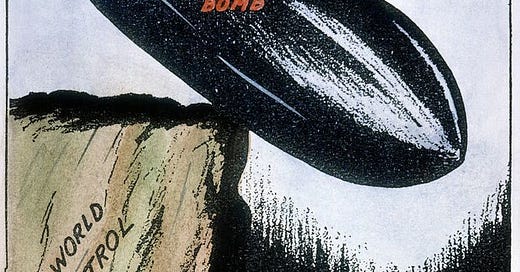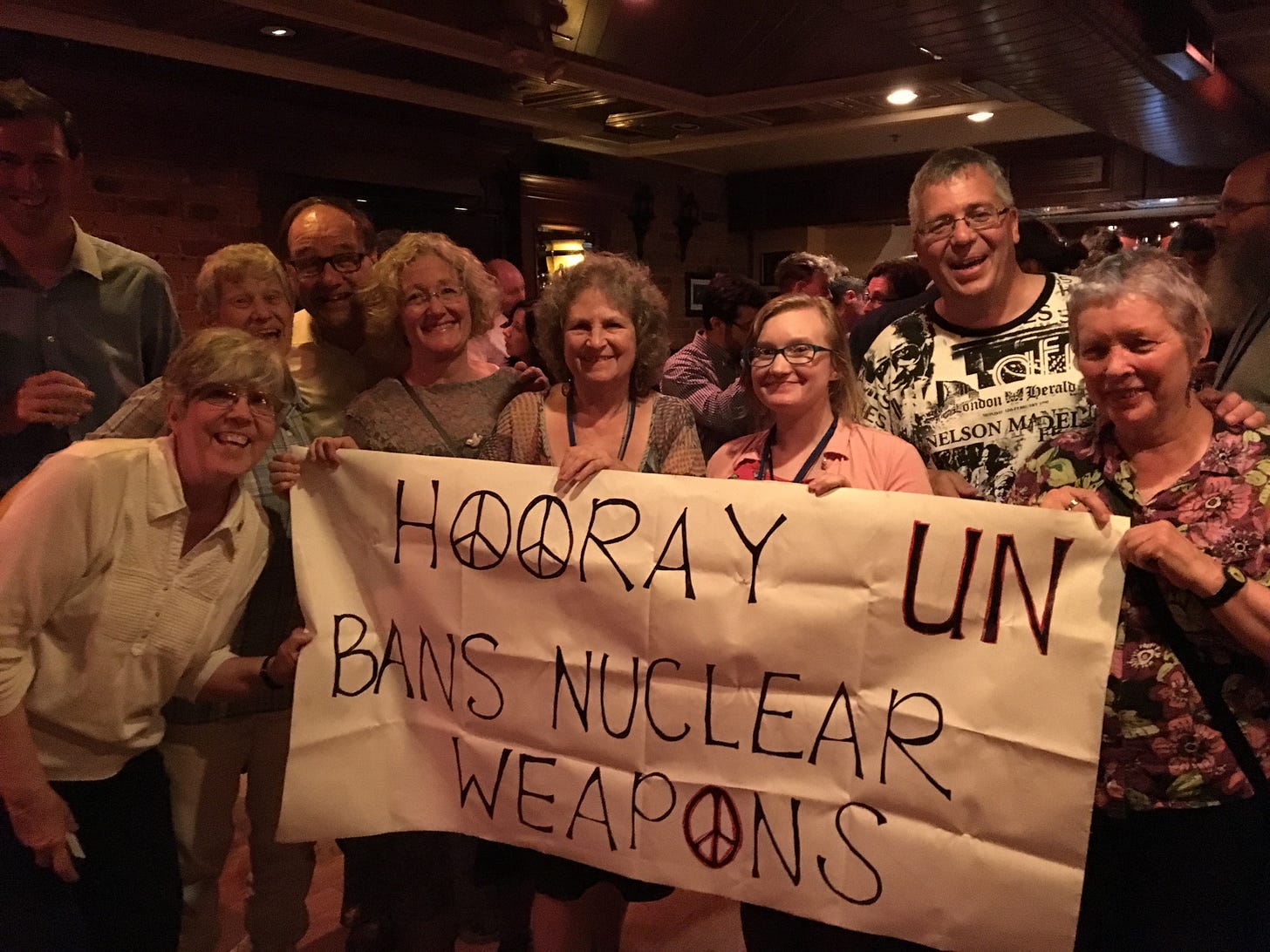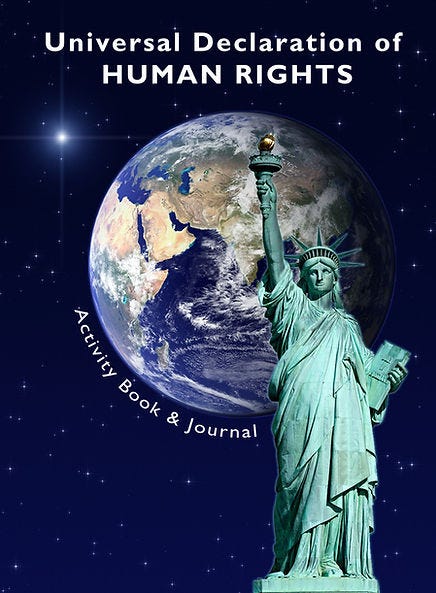
December 10 is a sacred day for me.
The Nobel Peace Prize is awarded every year on Human Rights Day. December 10 is the anniversary of the Universal Declaration of Human Rights, spearheaded by Eleanor Roosevelt, adopted by the UN General Assembly in 1948.
I am delighted that this year, at a time of insane nuclear saber rattling, with the Atomic Clock at 90 seconds to midnight, that the Nobel committee wisely chose to award the Peace Prize to Nihon Hidankyo, a Japanese global grassroots movement of atomic bomb survivors.
Known as Hibakusha, these survivors from Hiroshima and Nagasaki arose in response to the US atomic bomb attacks of August 1945 to demonstrate through witness testimony to achieve a world free of nuclear weapons. Over decades they have worked tirelessly to raise consciousness about the dangers of nuclear weapons towards developing an international norm to stigmatize the morality of using nuclear weapons, known as “the nuclear taboo”.
Now that they are in their 80s and 90s, this award is a profound validation of their life’s work and magnifies their impact and inspiration for us to carry on.
Hibakusha have been ever present at many international peace conferences. I have met some of them at the UN and at my visit to Hiroshima and Nagasaki in 2005 for the 60th anniversary of the US atomic bombings.
December 10, Nobel Ceremony, Oslo, Norway
I highly recommend watching a recording of the powerful and beautiful Nobel Ceremony, including musical performances.
40 year old Jørgen Watne Frydnes, the youngest Chair of Nobel committee, gave a magnificent speech, opening with a quote from The Russell-Einstein Manifesto.
“There lies before us, if we choose, continual progress in happiness, knowledge, and wisdom. Shall we, instead, choose death, because we cannot forget our quarrels? We appeal, as human beings, to human beings: Remember your humanity, and forget the rest. If you can do so, the way lies open to a new Paradise; if you cannot, there lies before you the risk of universal death.”
He ended with
So let us listen to the testimony of the Hibakusha.
Let their courage be our inspiration.
Let their persistence drive us forward.
Let us all strive to keep the nuclear taboo intact.
Our survival depends on it.
Teruma Tanaka, 92, Secretary General of Nidon Hidankyo, Japan Confederation of A- and H-Bomb Sufferers Organizations, gave a moving and informative acceptance speech, in which he described his experience as a 13 year old child in Nagasaki on August 9, 1945. He began with
“None of the nine countries that possess nuclear weapons — the United States, Russia, China, France, the United Kingdom, India, Pakistan, Israel and North Korea — appear interested in nuclear disarmament and arms control at present,” he said. “On the contrary, they are modernizing and building up their nuclear arsenals.”
In addition to the civilian casualties, I am infinitely saddened and angered that the "nuclear taboo" threatens to be broken.
I therefore plead for everyone around the world to discuss together what we must do to eliminate nuclear weapons, and demand action from governments to achieve this goal.
My Nuclear Nobels
I have been fortunate to have been active in two organizations that were awarded Nobel Peace prizes in 1985 and 2017. I interviewed 1995 winner, Joseph Rotblat in 1996, and met members of Nidon Hidankyo at UN Meetings and my visit to Hiroshima and Nagasaki for the 2005 60th Anniversary of the US atomic bombings. .
1985 International Physicians for the Prevention of Nuclear War (IPPNW)
IPPNW was founded in 1980 by US physician Bernard Lown and USSR physician Evgeny Chazov. IPPNW worked to inform the world on the potential consequence of the use of nuclear weapons in order to prevent nuclear war.
I was then a speaker for Physicians for Social Responsibility, PSR, the US branch IPPNW. I did slide shows on the image of the enemy and the psychology of the nuclear arms race.
At the time, PSR, led by Helen Caldicott, gave symposia all around the US on the medical consequences of nuclear war. My nuclear awakening was in October 1981 at the University of Pennsylvania, beginning with a map of Philadelphia with a big red circle around ground zero. It was a life-changing experience.
1995: Joseph Rotblat and Pugwash Conferences on Science and World Affairs, led by dialogue and scientific opinion, Pugwash Conferences on Science and World Affairs works toward a world without nuclear weapons. Joseph Rotblat dedicated most of his life to negotiate nuclear disarmament.
I interviewed him in 1996 in London for my research on the psychology of moral heroism and the courageous personality. As a young physicist, from an early experiment he could foresee the splitting of the atom and intuited the nuclear arms race. He agonized over what to do with this knowledge. When he was told that Germany was trying to get the bomb first, that settled his moral dilemma so he joined the Manhattan project. When he realized that Germany could not get the bomb, he was the only one to quit the Manhattan project.

2017: International Campaign to Abolish Nuclear Weapons (ICAN)
In 2017 I represented Transcend International at the UN Conference on a Treaty on the Prohibition of Nuclear Weapons, the Ban Treaty, for which the Nobel Prize was awarded to ICAN. Here is my analysis, Transcending Nukes
It passed with a joyous standing ovation (much longer than this clip).
Here is a touching response by prominent survivor, Setzuko Thurlow who waited 72 years for this moment.
If you are interested in what goes on in UN Nuclear conferences, here is my analysis of the Global Nuclear Dynamics of the UN Conferences.
I first presented this in July, 2024 at the International Society of Political Psychology in Santiago, Chile, and then again for the Earth Constitution Institute on August 9, 2024, recorded here My Nagasaki Day Panel Presentation
I analyze pathological dynamics of 3 UN processes.
· The Nuclear Nonproliferation Treaty (NPT)
· The Treaty on the Prohibition of Nuclear Weapons (TPNW
· The Conference on the Establishment of a Middle East Zone Free of Nuclear Weapons and Other Weapons of Mass Destruction
Nuclear weapons states (NWS) and allies dominate and sabotage the desires of non-nuclear weapons states (NNWS) and civil society in a conflict between nonproliferation vs. disarmament.
Universal Declaration of Human Rights and the Right to Live in Freedom from the Nuclear Threat
Over the years I have been surprised to discover how few people are aware of the existence of the Universal Declaration of Human Rights. Awakening to the fact that we have inalienable rights can shift consciousness, can be life-changing and ultimately world-changing. Discovering this deep, unspoken truth can be like breaking a spell.
In 2018 I created a deck of cards of the UDHR with activities to do with the cards.

Then I developed it into an activity book and journal, Living Rights: Making Human Rights Come Alive, on Amazon[1] as an e-book or print-on-demand.
It is an interactive workbook and journal with activities for all ages with space for writing and creative expression. It has resources for individuals, classes and groups or for those who plan workshops and events. It's designed to make our rights come alive with engaging activities to promote personal and global awareness and deeper understanding of our place in history, our common humanity and the importance of human rights for everyone in the world. It includes the Human Rights Pledge and other pledges and codes in the resources, and a list of all the Nobel Peace Prize winners.
The Human Rights Pledge
I will respect your rights regardless of who you are.
I will uphold your rights even when I disagree with you.
When anyone’s human rights are denied,
everyone’s rights are undermined, so I will STAND UP.
I will raise my voice.
I will take action.I will use my rights to stand up for your rights.
I created pages on my website - 5 pages with 8 “cards” on each page that people can print out and cut up to have your own deck so you can keep your rights in your pocket, The UDHR has 30 articles and I added 10 New Rights that were not imagined in 1948. See below, Free Human Rights Card Deck with activities.
You can make a pile of card with rights that you have that your grandparents or people in other countries don’t have, for example, My new, tragic activity is to make a pile of rights people in Gaza have. I know many of us are working to restore them.
UNIVERSAL DECLARATION OF HUMAN RIGHTS
Simplified Version
This simplified version of the 30 Articles of the Universal Declaration of Human Rights has been created especially for young people.
1. We Are All Born Free & Equal. We are all born free. We all have our own thoughts and ideas. We should all be treated in the same way.
2. Don’t Discriminate. These rights belong to everybody, whatever our differences.
3. The Right to Life. We all have the right to life, and to live in freedom and safety.
4. No Slavery. Nobody has any right to make us a slave. We cannot make anyone our slave.
5. No Torture. Nobody has any right to hurt us or to torture us.
6. You Have Rights No Matter Where You Go. I am a person just like you!
7. We’re All Equal Before the Law. The law is the same for everyone. It must treat us all fairly.
8. Your Human Rights Are Protected by Law. We can all ask for the law to help us when we are not treated fairly.
9. No Unfair Detainment. Nobody has the right to put us in prison without good reason and keep us there, or to send us away from our country.
10. The Right to Trial. If we are put on trial, it should be in public. The people who try us should not let anyone tell them what to do.
11. We’re Always Innocent Until Proven Guilty. Nobody should be blamed for doing something until it is proven. When people say we did a bad thing, we have the right to show it is not true.
12. The Right to Privacy. Nobody should try to harm our good name. Nobody has the right to come into our home, open our letters, or bother us or our family without a good reason.
13. Freedom to Move. We all have the right to go where we want in our own country and to travel as we wish.
14. The Right to Seek a Safe Place to Live. If we are frightened of being badly treated in our own country, we all have the right to run away to another country to be safe. 1
5. Right to a Nationality. We all have the right to belong to a country.
16. Marriage and Family. Every grown-up has the right to marry and have a family if they want to. Men and women have the same rights when they are married, and when they are separated.
17. The Right to Your Own Things. Everyone has the right to own things or share them. Nobody should take our things from us without a good reason.
18. Freedom of Thought. We all have the right to believe in what we want to believe, to have a religion, or to change it if we want.
19. Freedom of Expression. We all have the right to make up our own minds, to think what we like, to say what we think, and to share our ideas with other people.
20. The Right to Public Assembly. We all have the right to meet our friends and to work together in peace to defend our rights. Nobody can make us join a group if we don’t want to.
21. The Right to Democracy. We all have the right to take part in the government of our country. Every grown-up should be allowed to choose their own leaders.
22. Social Security. We all have the right to affordable housing, medicine, education, and childcare, enough money to live on, and medical help if we are ill or old.
23. Workers’ Rights. Every grown-up has the right to do a job, to a fair wage for their work, and to join a trade union.
24. The Right to Play. We all have the right to rest from work and to relax.
25. Food and Shelter for All. We all have the right to a good life. Mothers and children, people who are old, unemployed or disabled, and all people have the right to be cared for.
26. The Right to Education. Education is a right. Primary school should be free. We should learn about the United Nations and how to get on with others. Our parents can choose what we learn.
27. Copyright. Copyright is a special law that protects one’s own artistic creations and writings; others cannot make copies without permission. We all have the right to our own way of life and to enjoy the good things that art, science and learning bring.
28. A Fair and Free World. There must be proper order so we can all enjoy rights and freedoms in our own country and all over the world.
29. Responsibility. We have a duty to other people, and we should protect their rights and freedoms. 3
0. No One Can Take Away Your Human Rights.
UNIVERSAL DECLARATION OF HUMAN RIGHTS
New Rights Proposed Amendment to the 1948 UDHR © Diane Perlman, PhD
1. Right to a sustainable environment for future generations
2. Right to clean air
3. Right to clean water
4. Protecting plants
5. Animals’ rights
6. Right to clean power
7. Freedom from toxins
8. Freedom from plastic waste
9. Freedom from war, rights to conflict transformation
10. Freedom from the nuclear threat
[1] I try to avoid or boycott Amazon and give my business to others. I welcome any help in finding other ways to make my book available, I do not know how.











Thank you Diane what a thorough, detailed, important and interesting article!!!
The cartoon of the cape cod house with the family under an embrella in the back looks exactly like our former house in Wayne PA. And the anxiety of the teetering atomic bomb represents how so many feel today especially with the NATO/US/Ukrainian --Russia/Iran/N. Korea conflict. It needs de-escalation as soon as possible. Mike.